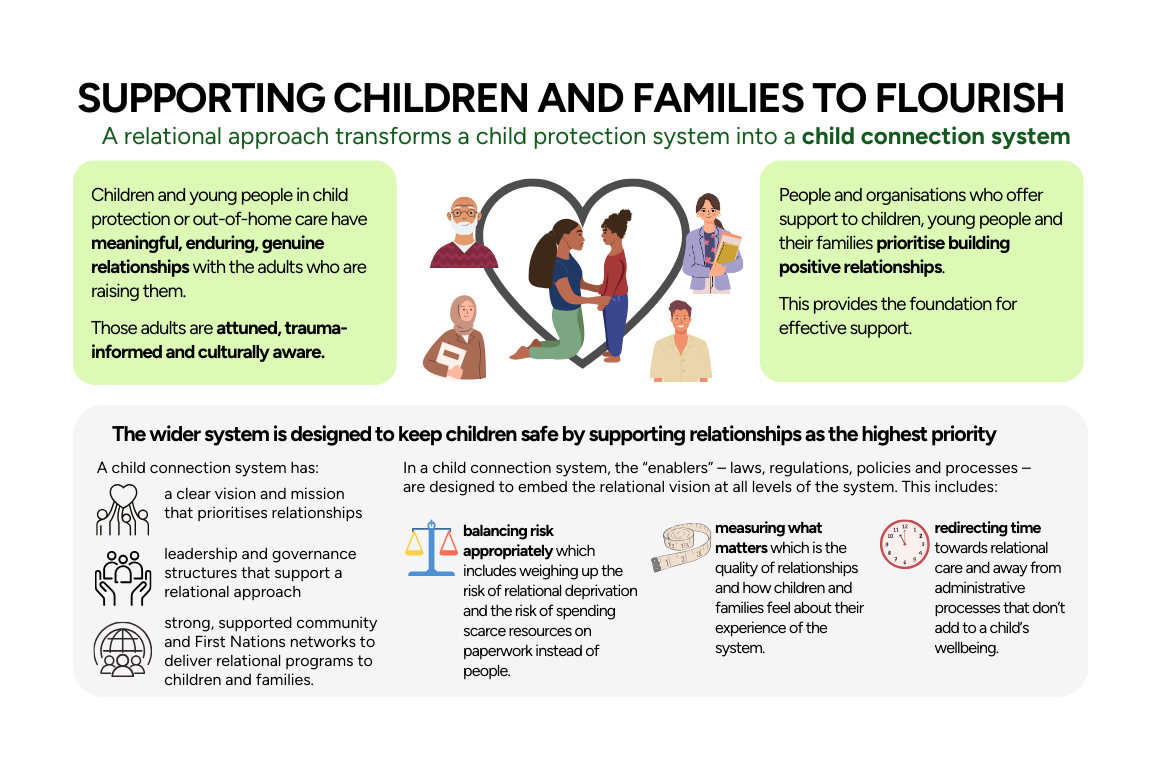
A new vision for child protection and out-of-home care
In NSW, the child protection and out-of-home care system's focus on preventing harm and ensuring safety has unintentionally hindered efforts to foster the loving, nurturing relationships children need to thrive.
Despite numerous reforms, deeply ingrained practices continue to prioritise managing risks over building trust with families and supporting their holistic wellbeing.
This pioneering report by the James Martin Institute for Public Policy, undertaken in close collaboration with the Centre for Relational Care and the NSW Department of Communities and Justice, offers a new paradigm.
It proposes a shift from an overburdened system focused on “report, investigate, and remove” to one where children are protected by fostering strong family and community relationships. It's also about children in out-of-home care having meaningful, lasting connections with the carers who are raising them.
At the Centre for Relational Care, we call this approach a “Child Connection System”.
This comprehensive vision reimagines the care sector, placing a strong emphasis on community-led, relational programs that have a proven track record of success. The report identifies key areas for action, including necessary changes to laws, regulations, policies, and processes to dismantle bureaucratic barriers and create a care system centred on relationships.
The proposed reforms encompass both immediate steps and long-term initiatives, including:
- A new social compact: A shared commitment between government, the care sector and the community to protect children through supportive family and community relationships, rather than relying on an overwhelmed system to “report, investigate and remove”.
- Prioritising relationship-based models when commissioning care and support services. This includes Aboriginal Community Controlled Organisations (ACCOs), which are grounded in the relational values of kinship and community central to First Nations cultures.
- Measuring the experience of families and carers: Introducing new metrics so that the direct feedback of families and carers on their experiences can help the sector to learn and improve.
- Redefining performance indicators: Implementing new performance indicators so that frontline workers can better reflect the priorities and self-defined goals of families, carers and young people in their work.
- Legal reforms: Undertaking substantive legislative reform to reflect a relationship-based approach to care. This would include revising mandatory reporting provisions to establish a “differential response” to direct low-risk children and families to a non-statutory support pathway.
- Streamlining regulations: Convening a working group to simplify regulations, reduce unnecessary paperwork, and ensure that frontline workers can dedicate the majority of their time to directly supporting children and families. Part of this would include reframing “risk”, to consider the long-term risks of relational deprivation.
- Supporting ACCOs: Continuing to redirect investment towards ACCOs, enabling them to reach and support more First Nations families.
- Investing in early help: Directing more investment towards community-based, targeted relational early help, and wrap-around support for struggling families to prevent their entry into the statutory system.
- Economic modelling for funding: Using detailed economic modelling to inform increased funding for early intervention programs and foster carers, with long-term savings expected from a reduced need for intensive support services and out-of-home care.
Moving forward, the Centre for Relational Care will continue to work alongside stakeholders in collaborative co-design of this reimagined care system guided by the wisdom of lived experience.
This report tells us what the future could look like but does not deliver us there. There will be multiple rounds of regulatory, legislative and policy reforms. But our first and most important task is to start this new orientation with conviction, knowing we will need to stay committed to real change.
Read the report
>> At a Glance (summary report)
Webinar
The Centre for Relational Care and the James Martin Institute for Public Policy co-hosted a webinar to provide an overview of the report, followed by a Q&A session.
